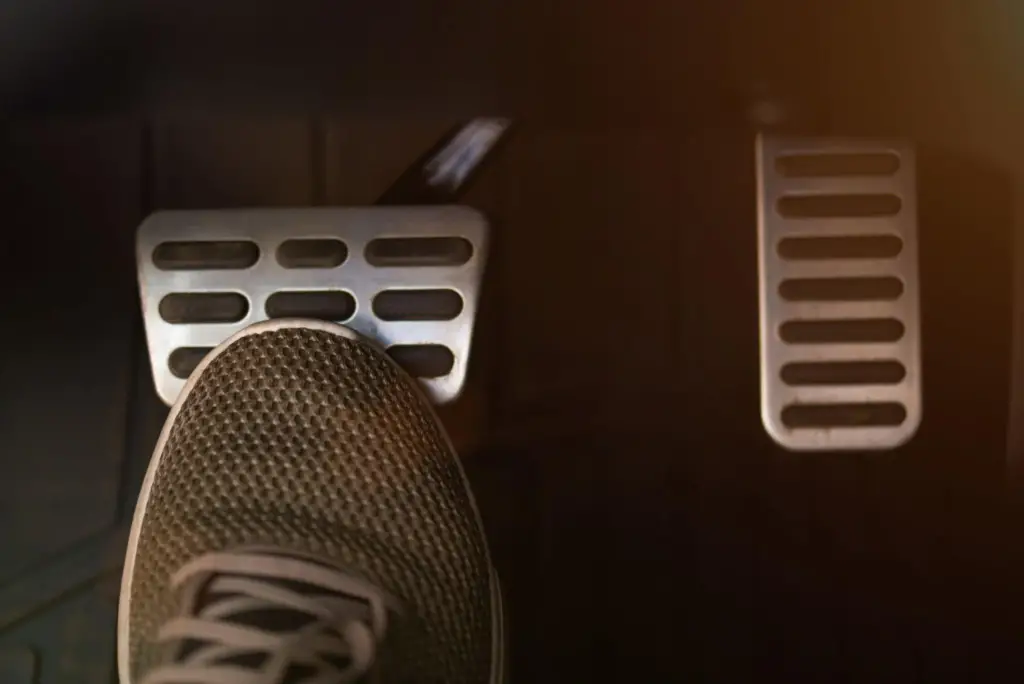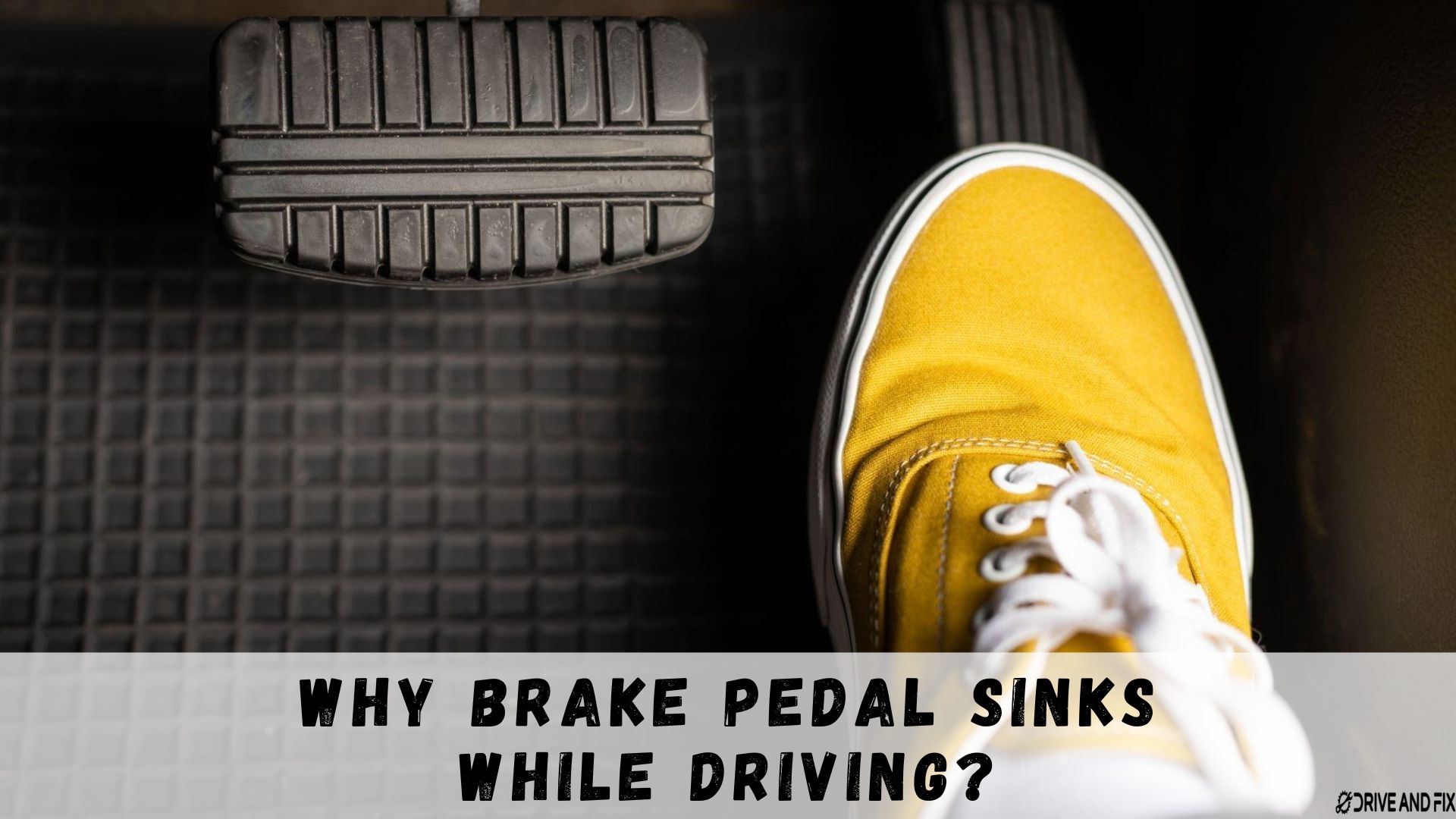Your car’s brakes are arguably the most critical safety feature since they allow you to slow down and stop the vehicle when necessary. So, if you’re driving and suddenly notice that your brake pedal sinks while driving, it can be a jarring and frightening experience.
A sinking brake pedal while driving is a serious issue that requires immediate attention, as it can indicate a problem with your braking system. It’s important to understand why brake pedal sinks while driving and the necessary steps to resolve the issue as soon as possible to ensure your safety and the safety of others on the road.
Reasons Why Brake Pedal Sinks While Driving

Pressing the brake pedal creates hydraulic pressure in the brake system, which allows the brake pads to clamp down on the rotors, slowing down or stopping the vehicle. If the pedal sinks toward the floor while driving, it indicates something is wrong with the brake system. Here are some of the potential causes:
- Brake fluid leak: The brake system is a closed hydraulic system that requires a certain amount of brake fluid to operate correctly. A leak in the system may cause a loss of hydraulic pressure, resulting in a sinking brake pedal. Brake fluid leaks result from a damaged brake line, caliper, or wheel cylinder.
- Air in the brake lines: If air gets into the brake lines, it compresses, hence reducing the hydraulic pressure in the system. This can occur if the brake system has not been bled well or if a leak allows air to enter.
- Worn brake pads or rotors: Worn out brake pads and rotors may not be able to generate enough friction to slow down or stop the vehicle. This can cause the pedal to sink when you press it.
- Malfunctioning brake booster: The brake booster amplifies the force applied to the pedal. If the brake booster is malfunctioning, it can reduce the pressure applied to the brake pads, causing the pedal to sink.
- Master cylinder failure: The master cylinder is responsible for generating the hydraulic pressure in the brake system. If the master cylinder fails, it can cause a loss of tension in the brake system, resulting in a sinking brake pedal.
Dangers Of Driving With A Sinking Brake Pedal

Driving with a sinking brake pedal is dangerous and should be addressed immediately. A sinking pedal indicates something is wrong with the brake system, which could lead to a loss of braking power or even brake failure.
- Increased stopping distance: If the pedal sinks, it shows a loss of hydraulic pressure in the brake system. This can result in increased stopping distance, meaning it will take longer for your vehicle to stop, potentially increasing the risk of a collision.
- Reduced braking power: A sinking brake pedal can also mean that the brakes are not applying enough force to the wheels to slow down or stop the vehicle. This can make it difficult to control the car and may result in an accident.
- Risk of brake failure: If the underlying cause of the sinking brake pedal is not addressed, it could lead to complete brake failure. If the brakes fail while driving, it could result in a severe accident.
Read Also: Passenger Seat Stuck In Recline – Causes, Troubleshooting, And Repairs
What To Do If Your Brake Pedal Suddenly Sinks To The Floor
If your brake pedal suddenly sinks to the floor, take immediate action to ensure your safety and the safety of others on the road. The steps below should help you:
- Stay calm and focus on the road: Don’t panic, and try to stay focused on the road ahead. Avoid sudden or sharp movements that could make the situation worse.
- Try pumping the brake pedal: If you notice the brake pedal sinking towards the floor, try pumping the brake pedal quickly several times. This can sometimes help to build up hydraulic pressure in the brake system and restore some braking power.
- Slow down and pull to a safe location: Slow down your vehicle and draw to a secure site as soon as it is safe. If possible, try to find a flat and straight stretch of road to pull over.
- Get the brake system inspected by a qualified mechanic: Once you have pulled over to a safe location, turn off the engine and contact a qualified mechanic to inspect it. Do not attempt to drive the vehicle if the brakes are malfunctioning.
- Consider calling for assistance: If you cannot safely drive the vehicle to a repair shop, consider reaching for roadside assistance or having the car towed to a repair shop.
Why Brake Pedal Hard When Car Is Off, Then Soft When The Car Is On

If you have a brake pedal that is hard when the car is off but becomes soft when it is on, there’s likely an issue with your vehicle’s power brake booster. The power brake booster increases the pressure on the brake system when you press the brake pedal, making it easier to stop the vehicle.
When the car is off, there is no vacuum pressure in the power brake booster, so the brake pedal will feel stiff when pressed. However, when the vehicle is turned on, the engine creates a vacuum that helps power the brake booster, making it easier to apply the brakes. An issue with the power brake booster can cause the brake pedal to feel stiff or soft, depending on whether the engine is on or off.
Final Thoughts
If you notice any unusual occurrences with your car like the brake pedal sinking while driving, prioritize the matter by getting a mechanic to inspect it. A sinking brake pedal while driving can be frightening, and potentially, knowing how to respond to this situation can help ensure your safety and prevent accidents on the road. Staying vigilant about vehicle maintenance and safety can help identify and address brake issues before they become a serious problem.
You May Also Interest:
The Essential Guide to Blown AC Fuse In Car Symptoms
Why Car AC Stops Blowing Cold Air After A While -Troubleshooting Tips


